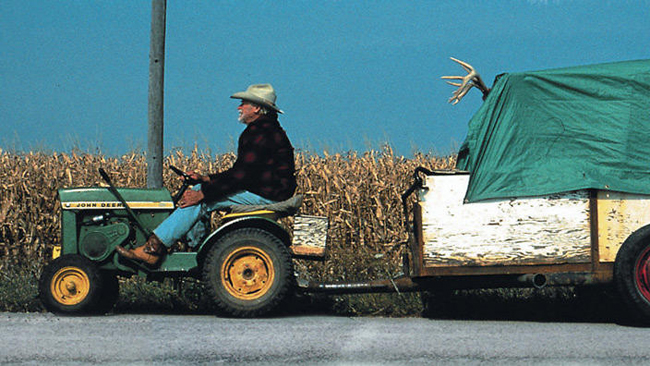 The Straight Story
The Straight Story
Contemporary Traces of the Modern Soundtrack
Developed for RMIT Media ArtsClose analysis
1. Starry night sky – the cosmos, the infinite. Sound of slight crickets with waves of low-level tinnitus ringing. Very gradual fade-up of music – it takes a long time for the music to reach any full level. It is diffused in the surround, and almost appears to not be connected to earth. This is the introduction of the main theme residing in a ‘non-place’. The theme carries at this level over aerial views of Lauren. The atmos is almost audible, but a dog’s bark is heard. The listening perspective is disconnected, not registering life on earth. It’s like an aural out-of-body experience.
2. This continues with the long crane-down of Rose leaving her home, exchanging hellos with her neighbour sun-tanning herself. Then the camera creeps down and closer to the house. The wind in the trees is almost absent. As the camera reaches the house window: a loud clunk is heard. The neighbour returns not having heard it and resumes her sun-tanning.
3. Alvin’s friend arrives to find Alvin and speaks with the neighbour. Over this scene is the introduction to precision planar placement of dialogue and sound effects in the front planar field. Their voices are veer toward the left or right dependent on their on-screen framing/placement, with the centre being used only when specific central action occurs. The film maintains this tactic of mixing, in contrast to the ‘psycho-acoustic’ effects of placing most dialogue in the centre.
4. Alvin and Rose in the kitchen the next day: extremely subtle and unobtrusive guitar strumming/picking floats through the scene. The guitar parts throughout the film bear this hesitancy and resistance to resolution. It relates to the unspoken/soft-spoken nature of Alvin and his community.
5. Alvin and Rose watch/listen to the lightning. The phone is very faintly heard ringing. By this stage the audience has been primed into listening very carefully for very soft sounds. Rose hears it and answers the phone. Tension is built with the possibility that she’ll be shocked by the storm while using the telephone, but instead, we – and Alvin – hear her responding to some unknown bad news. But Alvin’s face registers that he knows what’s happening, and is visibly upset. A soft low rumble wells up – it sounds like the main theme slowed down a couple of octaves and put through a long reverb. This relates to the diffusion in the opening title, but here it is rendered lugubrious and ominous. Rose announces that Alvin’s brother Lyle has had a stroke: cut to very loud lightning strike.
6. Rose talking to Bobby on the phone in the kitchen: she talks in a dysfunctional manner, traumatized by the forced separation of her children due to her own psychological instability. Her speech patterns carry the scar of this wrenching, leaving her to speak grammatically correct sentences but in a timing which forces the flow of meaning through a series of ruptures and spurts of fragmented phrases and clauses. Like Alvin, her voice is her story - not through words as written into her, but as words sounded through her.
7. Rose watching out her window at night: no sound is heard of the visible sprinkler, the kid’s ball and footsteps – we are in Rose’s silent thoughts. An acoustic guitar theme on the high strings is played, symbolising her delicate nature. The rhythm is also reminiscent of her halted speech.
8. Alvin and Rose outside at night in the field. They enjoy listening to the sounds around them – they are comforting because they affirm their location, their position, their sense of homeland.
9. Alvin driving his tractor-mower down Main Street – the steel guitar/slide/fiddle/bass theme starts up. It’s gentle chugging rhythm matches his ambling pace. The theme carries across Alvin starting his journey down he road. The camera pans up to the sky – to the cosmos and heavens looking over him. The title sequence is now repeated in form, indicating Alvin’s relation to the land, mobility and pace of life. The soft atmos and sfx frames the perspectival nature of the musical theme.
10. As Alvin passes by the Grotto sign, a huge semi-trailer approaches unseen but heard by its deep ground-shaking rumble. This is the noise of progress, of speed, of industry: it’s the opposite to Alvin’s making his way through life.
11. After he purchase his new tractor-mower, Alvin leaves as Rose watches him: the camera tracks by her in the garden at the speed of the tractor-mower. The tractor-mower theme recommences. It plays across shots of clouds slowly creating patterns on the fields. The theme, Alvin and nature are in synch with each other.
12. Alvin tells the runaway girl about Rose loosing her children. Rose’s theme fades up over shots which repeat her looking at the window at the sprinkler. Alvin says there’s not a single day goes by without her thinking of the children who were taken away from her. Rose’s theme is further contextualised by this information.
13. Thunder rolls and breaks while Alvin drives along. Loud noise is also the sound of nature exhibiting its formidable power. Alvin is worried, then spies an isolated shed. The sound of his tractor-mower is loud: it matches his mounting anxiety to get into the shed before the rain’s downfall: he makes it just in time.
14. A return to the aerial shots of fields while Alvin’s theme plays.
15. A massive phalanx of marathon bike riders suddenly passes Alvin. He is disoriented by their surreal appearance. He pulls over and watches their endless line pass-by. A ringing extended tonal sheet fades up: it’s the strange sound of Alvin’s soft anxiety, as though his heart and nervous system has irrationally sped up and occupied his consciousness. Here we here Alvin from the inside-out: it’s a glimpse of the anxieties swirling behind his generally calm composure.
16. When Alvin’s breaks fail as he approaches a steep descent, the sounds of his engines and its mechanisms become amplified and detailed: this reflects Alvin’s sharp realization of what’s happening to the tractor-mower’s engine.
17. Alvin setting up camp in the front lawn of Danny and his family. In this long shot, their dialogue is heard proportionate to how softly one would hear people speaking from that distance. While the movies employs many subjective psycho-acoustics moments to illustrate how Alvin sense the world, there are as many ‘hyper-real’ moments which counter the linguistic conventions of film sound language (how dialogue is ‘normally’ mixed in films).
18. Later, we hear Alvin in conversation with Danny. In contrast to Rose’s fractured speech and voice, the voices of Danny’and many of the warm and simple folk Alvin knows and encounters evokes an archetypal Americana. Their rich sonority and the effortless way in which it flows from their mouths sonically portrays a comfortable middle America - retired and retiring - not in a parodic way, but as a means of contrasting their fortunate life against the emotional trauma which Alvin has been holding within him for so many years.
19. Alvin looks up to the night sky – cross-fade to the next morning as Alvin checks his wallet to find he hasn’t enough cash to pay for the tractor-mower repairs. A series of highly elongated reverberant washes fades up over a nylon string guitar theme: these textures are the string synth parts from the opening theme. They wash over the guitar part, like blurred peripheral vision. This ‘de-mixed’ theme represents Alvin’s aural condition, where listening is starting to become a vague and fluid activity. This state of aural comprehension is one of the key factors which has determined the unique ‘unnatural’ approach to mixing and sound editing in the film.
20. Alvin with the other older guy at a bar. Alvin opens up: C&W music plays almost inaudibly in the background. They both reminisce about their repressed memories from coming back after WWII. Their silence is not acoustic and personal: it is psycho-acoustic and shared between them. In this ‘synchronised aural space’ the other older guy opens up and tells a traumatizing story which he has never divulged to a living soul. His voice continually breaks up; occasional sound effects of bombs, planes and machine gun delicately move behind his dialogue. Alvin mentions how he can’t forget how young his comrades and enemies were. These men look frail and old, but their memories are frighteningly potent, yet undisclosed to others. Alvin’s story is about having accidentally shot one of his own men. The scene finishes with a long shot of their backs at the bar, the faint sound of Alvin breathing deeply. To the world around them, nothing is happening at their emotional ground zero.
21. Rose’s theme (nylon string guitar) fades up when Alvin tells the Olsen twin brothers how Alvin is estranged from his own brother, and that the trip to Mount Zion in Wisconsin is very important to him. The brothers are moved by this, as is Dan listening to Alvin. The theme now accrues the sense of compassion that Alvin – having cared for his disabled daughter Rose – has for all those with whom he comes into contact. The theme carries over into the next morning as Danny – knowing that Alvin didn't want to be seen off by Danny – watches through the kitchen window Alvin departing. We only hear the tractor-mower revving, but watch Dan’s face: he is an example of someone affected by Dan’s worldly compassion – thus the cue plays over his close-up.
22. As Alvin’s travelling theme plays as he crosses the Mississippi river. It’s slow pace matches all the tracking shots which are timed to the speed of Alvin’s tractor-mower. He is visibly excited by seeing the grand river: the music again shows his synchronism with nature, as he takes in the sights due to his slow mobility, rather than racing through the landscape and missing its sights.
23. Yet this scene finishes with the off-screen sound of a river barge. It is timed to the fade-out of Alvin’s travelling theme, and a low ringing hum fades up. The scene cross-fades to a cemetery at night: there is still some doubt and dread about what lies ahead for Alvin.
24. Alvin approaches Lyle’s place – a string duo theme plays with hardly any location sound or atmosphere. Suddenly as the tractor-mower starts playing up, the sound of the engine fades up loudly: the engine dies. Lyle sits on his tractor-mower helpless in silence.
25. A large tractor drives by and makes some suggestions to Lyle. Their scene is played out in long shot in very soft volume. Lyle starts up the tractor-mower again and it works: he drives behind the large tractor, which is heard loudly and clearly.
26. When Alvin and Lyle meet on the porch, very little is said, but in their silence a strong connection is made. They look up to the sky: cross-fade to the night stars with the opening theme played. This time, the camera is moving into the stars: as the story concludes with what may be the brothers’ last connection, they become one with the cosmos, returning to their happy memories of looking up to the starry night sky. The music symbolises this return to their friendship.
Text © Philip Brophy.

